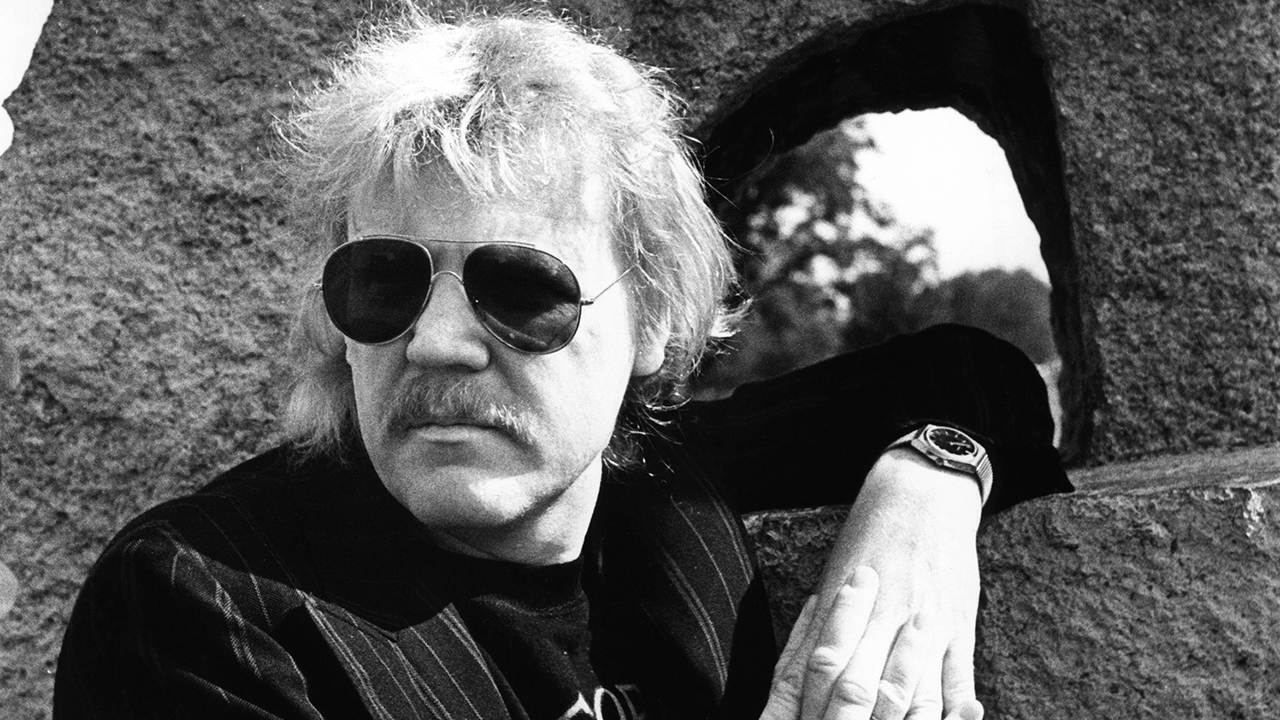How Pain Of Salvation turned their terrifying struggle into In The Passing Light Of Day
After contracting a rare flesh-eating virus, Pain Of Salvation's Daniel Gildenlöw thought his life was over, never mind his career. In 2017, he told Prog how he fought through it and turned that pain into a stunning album

It’s hard to believe that in 2015, Pain Of Salvation frontman Daniel Gildenlöw was struck by a near-fatal ordeal that left him hospitalised for six months. The promo shots for In the Passing Light Of Day show a man in top physical form. But at the start of 2014, Gildenlöw suffered the most excruciating of illnesses when his body was attacked by flesh eating bacteria otherwise known as Necrotising Fasciitis. What started as an annoying and painful sensation became a debilitating disorder within a matter of hours, that sent him spiralling into a physical and mental nightmare which consisted of multiple operations under general anaesthetic. But those familiar with the prog singer from Sweden might know that Gildenlöw is a character, a strong-willed and perennially honest and open spokesperson who approaches life with a glass-half-full mentality and doesn’t shy away from talking about his experiences.
Gildenlöw is back with Pain Of Salvation’s 10th studio album In The Passing Light Of Day, inspired by the events of 2014. An uncompromisingly dark effort that reflects on the first crippling stages of the infection, it’s a return to the abrasive, harder-edged sounds that the band exhibited on their acclaimed 2007 album Scarsick. From the opening churn of On A Tuesday, it presents a bold narrative on the singer’s personal torment, reflected in both the album’s angular sonic punch and the gritty and brooding lyrics.
“There’s not a lot happening in real time in the concept of the album, it’s more about the thoughts I had in that very short moment, on that first day before having the surgery,” says Gildenlöw. “It was a pivotal moment when I went from thinking, ‘This is so painful and annoying’, to ‘Damn, this might not actually go down too well’. It was a very short period of time; I was in so much pain that I hardly knew my own name or could speak but I could sense that behind the smiles of the doctors, they were very concerned. It felt like trying to balance on one leg on a huge slippery ball of something and that ball was pain. If I didn’t find my balance I would go totally crazy.”
Originally, the idea of writing a concept album about flesh-eating bacteria didn’t sit comfortably with Gildenlöw, not least because the subject matter sounds like something reserved for gore-obsessed metal bands. But when it came to forming the ideas to the band’s follow up to 2014’s Falling Home, an album of reworked old material and covers, understandably, it was pretty much the only thing he could think about. Not content with plunging head-first into the harrowing memories of losing your marbles in a hospital bed for the sake of musical creativity, Gildenlöw set about using the experience to inspire the accompanying artwork. He was contacted by their photographer who proposed that they do a photo shoot in the hospital where Gildenlöw was treated. Doubting very much that they would be allowed access to the premises for the project, the singer nonetheless set about contacting the surgeon who treated him and, in a weird twist of fate, was given the go ahead.

“She told me that the entire ward had been moved to another part of the hospital – I still don’t know why – so not only could we shoot in the hospital but I’d be able to use my old room. So just a few weeks later I was entering the hospital, my old ward, gaping empty, echoey, dark and in the middle of the night and with me lying in my hospital bed in a hospital gown. It was so weird.”
Weird indeed. If the crap-your-pants creepiness of spending a night in an empty hospital ward isn’t enough to question Gildenlöw’s sanity then surely his readiness to fixate on a time spent being munched by millions of life-threatening bacteria rings alarm bells?
“I’m like that in a way,” he admits. “It needs to be remembered. Even though the situation was terrible there’s a feeling of thankfulness. 2014 was filled with obstacles and challenges but I didn’t feel any hostility towards the year. It was year of extreme pain and problems but it was also a year of winning an important battle.”
Sign up below to get the latest from Prog, plus exclusive special offers, direct to your inbox!
Perspective is a powerful thing. When Prog caught up with Gildenlöw the at the end of 2014 he had resolved to do two things: spend more time with his family and with his band. By all means, family life is good but the latter seems pertinent given the carousel of band members that the band have endured throughout their career, with no less than nine former members and a fervent fanbase willing to express their opinions on line-up changes. In 2011 Daniel Karlsson (keys) and Ragnar Zolberg (guitar) joined the band after a less than amicable re-shuffle but In The Passing Light Of Day is their first ‘proper’ album since 2011’s Road Salt Two. With a 2017 release date (on Friday January 13 for those of a superstitious mind) that leaves a hefty gap between albums. In short, it hasn’t been an easy ride for Gildenlöw. Even a few days before he was hospitalised, he admits that he marked New Years Eve by saying “good riddance” to a troublesome year. Maybe it comes with frontman territory but Gildenlöw, who set up his first band aged 11 and who won Best Vocalist in the Swedish Annual Music Contest ‘Rock-SM’ aged 14, is a man on a mission. And it hasn’t gone unnoticed. In 2007 documentary makers Mapenzi Film set their sights on the singer and filmed him for the next seven years, releasing their output recently in a series of videos available to view for free online.
“The mutual plan was to follow me one album to the next,” says Gildenlöw. “And then loads of weird stuff happened so there was no natural exit point. They weren’t meant to film for that long, it grew into this eternal project. I gave them free rein to do what they wanted but I didn’t want to watch it. I’d rather go back to the hospital than watch myself in a video. But Johanna [his wife] said I have to watch at least some of it because people are going to ask questions, so I’ve seen a bit. It was a difficult time in the history of the band, for sure. There was a lot of struggle.”
What started out as a short documentary turned into a series of films. In one particular episode, entitled The Break-Up, the filmmakers capture the acrimonious departure of bassist Simon Andersson, with Gildenlöw describing him as “evasive and provocative” and Andersson retorting with “There are a lot of double standards when it comes to Daniel” and “It’s like talking to a wall”. No wonder Gildenlöw is reluctant to watch it.

On the evening that Prog is chatting to the singer this time around, he is at home and it is getting late. After wrapping up this chat he will work on artwork for In The Passing Light Of Day and squeeze in a little sleep before getting up early to teach music to children in a nearby school. He admits that in the last few days he’s been getting by on about four hours sleep a night due not only to the demands of the album’s release but also because of his new teaching project, which focuses on enlightening kids aged seven to 12 on music education. “I didn’t know that the human body and mind could feel this tired,” he admits. Nonetheless, he delights in engaging with the young minds of today.
“I try to mesmerise them by giving them information and knowledge probably way beyond what they need to know,” he divulges, and then goes on to explain that at that age you were either a Depeche Mode or a Kiss kid. Gildenlöw was team Kiss.
As it becomes apparent not only through the multi-faceted sonics of Pain Of Salvation, from the conceptual trip of BE to the eclectic rock-based adventures of their recent outings, but also through the frontman’s own personal challenges, that Gildenlöw possesses an admirable but sometimes questionable will and vision that leads to some surprising revelations.
“I’ve started doing parkour and capoeira. All of a sudden I am there learning back flips at the age of 42. I can do back flips and front flips and I’m working on side flips, but that’s a weird move. I was embarrassed that it took me two months to learn back flips but once I did it a guy said to me, ‘That took me years to learn’. He was 16.”
And that’s why, on the photos for In The Passing Light Of Day, you’ll see a stronger, leaner Gildenlow and that’s why nothing will get in between a man and his vision.
This article originally appeared in Prog 53.
Pain Of Salvation have gone and covered Holy Diver
Pain Of Salvation - In The Passing Light Of Day album review
With over 10 years’ experience writing for Metal Hammer and Prog, Holly has reviewed and interviewed a wealth of progressively-inclined noise mongers from around the world. A fearless voyager to the far sides of metal Holly loves nothing more than to check out London’s gig scene, from power to folk and a lot in between. When she’s not rocking out Holly enjoys being a mum to her daughter Violet and working as a high-flying marketer in the Big Smoke.

